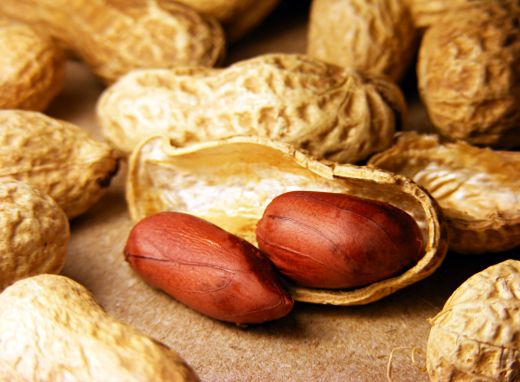“GEORGIA‑18RU” is a new high-yielding, normal-oleic, TSWV-resistant and leaf scorch-resistant, medium-large seeded, runner-type peanut variety that was released by the Georgia Agricultural Experiment Station in 2018. It was developed by Dr. William D. Branch at the University of Georgia, Coastal Plain Experiment Station, Tifton, GA. During five-years averaged over multiple location tests in Georgia, Georgia-18RU had the highest percent TSMK grade and the lowest number of seed per pound compared to the Georgia-06G runner-type variety. Georgia‑18RU was likewise found to have a similar low percent TSWV and total disease incidence, high yield and dollar value return per acre as Georgia-06G. During 2018, Georgia-18RU was also found to have lower TSWV and total disease percentage with higher yield, grade, and dollar values compared to five high-oleic runner-type varieties. Georgia-18RU combines high yield, high grade, high dollar value, TSWV resistance, and leaf scorch resistance with the desirable normal-oleic trait for peanut butter manufacturers. It also has similar roasted flavor, blanchability, and maturity as Georgia-06G.
Breeder
Dr. William D. Branch
Dr. William D. Branch is an award-winning plant breeder who oversees the peanut breeding program at the University of Georgia’s Tifton campus. He has long been actively involved in the development of improved varieties of peanuts. These desirable traits include increasing yield, grade, better shelling characteristics and shelf-life; enhancing flavor and nutritional qualities; and improving resistance to disease, insects, viruses, nematodes, aflatoxin and drought.
Since joining UGA in 1978 as an Assistant Geneticist, Dr. Branch has received numerous awards for his work, including the Dow AgroScience Award for Excellence in Research (2005), the American Peanut Council’s Peanut Research and Education Award (2003) and the Georgia Crop Improvement Association Distinguished Service Award (2003).
Dr. Branch holds a 100 percent research appointment in peanut breeding. It normally takes about 10 years to develop a new cultivar, and he has released 19 new peanut cultivars from 1986 through 2012 (including one a year from 1999 through 2012). He holds seven plant patents and has been involved in the publication of numerous plant breeding and crop science papers.
Dr. Branch has served as Chairman, Peanut Crop Registration Committee for Crop Science Society of America; Coordinator, National Uniform Peanut Performance Tests involving all major peanut states; and as a member of the Peanut Crop Germplasm Committee of the USDA National Plant Germplasm System. He also served on the Georgia Crop Improvement Association Advisory Committee and the Peanut Commodity Committee and the Plant Cultivar and Germplasm Release committees of the UGA College of College of Agricultural and Environmental Sciences.
His professional affiliations include the American Society of Agronomy, the Crop Science Society of America, the American Peanut Research and Education Society, the American Genetic Association, the Council of Agricultural Science and Technology, the American Peanut Council, and Sigma Xi.
He received his B.S., M.S., and Ph.D. degrees from Oklahoma State University at Stillwater, OK.
Affiliations
- Department of Crop & Soil Sciences
- University of Georgia, Tifton Campus

